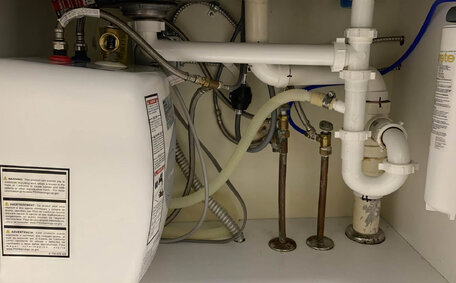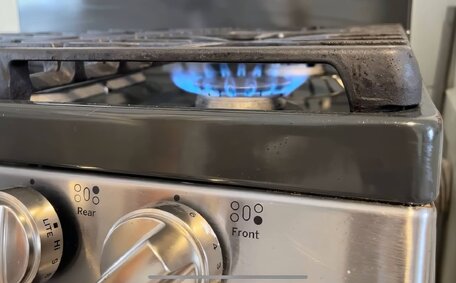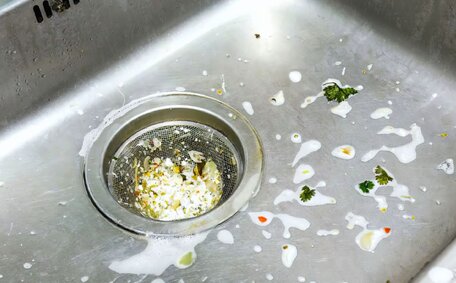Introduction to Types of Plumbing Materials
When undertaking any home project, selecting the plumbing options that are best for your situation is a crucial decision. The plumbing pipes selected must be the best for your particular requirements—durable, safe, and suitable for their intended purpose, whether transporting drinking water, handling waste, or supplying gas appliances.
Australian homes use various types of plumbing pipes, including steel, each suited to different requirements:
- PEX - Flexible plastic water pipes, excellent for hot cold water supply, are frequently employed in water supply line applications. Easy to install, cost-effective, and well-suited for both hot and cold water needs.
- PVC - rigid plastic pipes used for waste lines and vent stacks. Highly resistant to corrosion and chemical damage.
- Copper - Copper, a premium material for water and gas lines, is renowned for its strength and longevity. Long lasting but rigid and more expensive to install.
- Cast Iron - Historically popular, durable iron piping is used less frequently today. Still used for some waste lines.
- Stainless Steel - Strong, corrosion resistant metal pipes often used in commercial kitchens and laboratories.
This article will illuminate a variety of plumbing pipe types and their unique attributes, alongside other plumbing materials to aid in making an informed selection.
Assessing Your Home’s Plumbing Needs
Choosing the right types of plumbing pipes for your home involves considering these crucial factors:
Water Type
The type of water supply in your area - either municipal water or from a private well - is an important determinant of which pipes best suit your needs. Hard water, for example, can corrode metal pipes over time, especially when compared other material options. PEX or PVC, pipes which can used that can easily face the challenge of hard water, may be better suited for such areas.
Soil Characteristics
Soil composition can affect the durability of underground drainage pipes. Certain soils contain chemicals that can degrade pipes or allow tree roots to penetrate and potentially damage your pipes. Under these circumstances, there’s no superior pipe commonly chosen than cast iron or clay for drainage pipes.
Sunlight Exposure
PEX, UV-stabilised plastic, is most commonly recommended for bathroom plumbing that will be exposed to sunlight. This prevents the pipes from becoming brittle and cracking after prolonged sun exposure, ensuring UV resilience.
Use Cases
Consider applications where specific pipe types excel, like supply, drain, gas, or sewer lines. Different pipes like copper for gas, PVC for sewers, and more, excel in distinct applications. Professionals such as Jamisontown Plumbing can introduce options such as brass piping and assist in selecting suitable materials for your bathroom renovations.
consider when choosing, assessing these factors to guide you in selecting the right type pipe tailored for longevity, safety and efficiency in your home.
Common Pipe Materials Used in Home Plumbing
Copper - A traditional material used extensively for home gas and water lines over decades. Copper pipes provide a highly durable material with excellent corrosion resistance, ensuring optimal water flow in your home’s plumbing system. However, the rigid copper pipes can present more challenges during installation than their flexible plastic counterparts.
PEX - Flexible cross-linked polyethylene, a tubing ideal for both hot water supply lines and radiant floor heating systems. PEX, most common type, is cost-effective, features an easy install process, excellently equipped for hot cold water transport, and is appropriate for potable water in Sydney homes.
PVC - Polyvinyl chloride pipe is inexpensive, durable and chemical resistant. This variety is broadly used in plumbing for wastewater and drainage applications, and is often used in water supply lines.
Cast Iron - Cast iron pipe was previously the material of choice for drainage systems. It is durable but, compared to other commonly used materials, is being replaced by PVC. While new cast iron pipes are rare, they can still be found in some of the older homes across Sydney.
Choosing the right pipe types and utilising modern push-fit fittings can simplify DIY plumbing, with added guidance from professional plumbers. Or, if you need new plumbing, call a plumber, such as the reputable professionals at Jamisontown Plumbing, for expert advice.
Comparing Durability of Pipe Options
When it comes to longevity, pipe materials vary greatly in their expected lifespan under normal conditions:
- Copper - Can last 50 years or more. Resists corrosion and can withstand intense pressure.
- PEX - PEX also has a lifespan of about 50 years. Flexible tubing is durable, ensuring efficient water flow but susceptible to damage from UV light or rodents.
- PVC - with a lifespan exceeding 80 years. Highly corrosion-resistant, it’s ideal for cold water supply and performs well under low water pressure conditions.
- Cast Iron - Can survive over 100 years underground. The most durable material but expensive and challenging to repair.
To ensure your investment is safeguarded, these kinds pipes such as stainless steel, solid copper, and resilient steel cast iron offer the most longevity. Diligent regular upkeep also ensures your plumbing system remains in reliable working condition for years to come.
At Jamisontown Plumbing, our experts can recommend the optimal materials for all your plumbing requirements, Ensuring the best your resilient home system.
Evaluating Costs of Different Pipe Materials
When selecting pipe materials, cost is often a primary consideration alongside durability and performance. Here is an overview of typical costs for the best plumbing types utilised in plumbing:
- Copper - $15 - $20 per metre installed. More expensive upfront but lasts 50+ years.
- PEX - $4 - $8 per metre. Inexpensive, particularly for DIY installation of supply pipes.
- PVC - $2 - $4 per metre. Budget option for drains/vents.
- Cast Iron - $20+ per metre. Costly but extremely durable, 100+ year lifespan.
Other factors affecting cost include the size and diameter of pipes, accessibility, required plumbing fittings, and the complexity of drain installation. When planning your project, consult a professional like Jamisontown Plumbing to ensure you select the right plumbing pipes for your specific needs while maximising long-term value.
Considering Water Safety with Pipe Choices
When selecting pipe materials, it is crucial to consider water safety. Any components transporting drinking water must be lead-free and made from non-toxic materials approved for potable water.
Some pipe materials inhibit bacterial growth more effectively than others. Copper and stainless steel pipes possess natural antimicrobial properties, due in part to their metallic composition, while plastics like PEX and PVC do not, due to their nature. It’s essential to note the right plumbing options to ensure proper sanitation and avoid any risk of contamination.
Also assess corrosion resistance, especially with metal pipes. Materials that corrode can leach toxic chemicals into water over time. Opt for materials like PEX or PVC that resist rust, reducing health risks from corrosion.
Consider flame spread ratings. Materials like PEX minimise fire risk if pipes are damaged because they self-extinguish when ignited. This prevents flames from spreading through walls endangering occupants.
Qualified plumbers, such as Jamisontown Plumbing, ensure you choose the best materials for safe, uncontaminated water delivery in your home.
Meeting Building Codes and Regulations
When undertaking any plumbing installation or renovation, it’s crucial to know which local building codes and regulations to comply with. In Australia, all plumbing work, including the use of materials such as galvanized steel, must comply with the Plumbing Code of Australia (PCA) as enacted in state and territory laws.
The PCA sets strict standards for materials, design, installation and inspection of type piping and plumbing systems. Key considerations for selecting the right plumbing pipes include:
- Using approved pipes such as materials that are fit-for-purpose can save you from future issues
- Correct sizing of pipes and valves to manage anticipated water volumes
- Shielding your pipe system from contamination, backflow, and leaks
- Allowing adequate ventilation in waste systems
Other regulations pertain to specific areas like water systems for fire safety, gas fittings, and wastewater management. Complex jobs may require council approvals or certification from licenced professionals.
To simplify compliance, the best approach is to consult reputable plumbers like Jamisontown Plumbing from the start.
Our fully licenced and insured experts specialise in designing, supplying premier plumbing supplies, and installing pipe plumbing systems that meet or exceed all Australian standards - giving you peace of mind your new water system is safe, efficient and built to last.
Choosing Eco-Friendly Piping
It is prudent to consider the environmental impact of plumbing materials, along with their functionality and expense. Eco-friendly options, encompassing different types of environmentally conscious piping, include:
- PEX - Made from polyethylene, PEX materials can be highly recyclable and require low embedded energy for their manufacturing process.
- PVC - PVC, recyclable and commonly regarded as an eco-friendly piping choice.
- Copper - Copper pipes, fully recyclable, can be ethically sourced to reduce environmental harm from mining activities.
- Cast Iron - Cast iron lasts for generations and therefore has an extremely low long-term impact.
Sustainable plumbing materials also support water conservation by preventing leaks and ensuring efficient water delivery. At Jamisontown Plumbing, we take care to recommend and install piping designed to minimise environmental footprints.
With some eco-friendly options costing a little more upfront, understanding how much longer-lasting materials offset this premium is vital, as they can provide decades of reliable service life. We strive to advise on the best options for your home or business, balancing affordability with green values when planning plumbing solutions.
Importance of Regular Maintenance
Regular servicing is essential to maintaining a safe and efficient plumbing network over time. Preventative maintenance protects against costly emergency repairs resulting from unexpected pipe failures or leaks.
Homeowners can perform simple maintenance tasks to prevent common plumbing issues:
- Inspecting your home’s pipes for signs of cracks or corrosion
- Checking water pressure at plumbing fixtures to catch drops indicating internal scaling or blockages
- Clearing drains and screens to remove hair and debris causing clogs
- Testing and resetting temperature/pressure relief valves on your water heater to ensure your system’s optimal functionality
To make sure your plumbing is in top condition, a professional plumber like Jamisontown Plumbing provides services such as:
- Hydrojet drain cleaning to clear stubborn blockages
- Camera inspections detecting leaks or pipe integrity issues
- Pipe leak repairs performed promptly to prevent damage your home might suffer from water intrusion
- Pipe replacement or relining services to replace your aging drainage systems and extend their lifetime
Adhering to manufacturer guidelines for plumbing equipment maintenance is advisable. Regular upkeep ensures that high-quality materials chosen from the start continue to serve reliably for many years.
Working with a Professional Plumber
Expert plumbing installation and maintenance are crucial for ensuring safety, adhering to compliance, and achieving durability. Although DIY plumbing may appear straightforward, it is advisable to consult a licensed professional plumber.
At Jamisontown Plumbing, our fully qualified and experienced plumbers specialise in top-tier residential plumbing installations and repairs across Sydney. We stay up to date on the latest methods and materials to design solutions tailored to your needs.
Working with Jamisontown Plumbing offers expert advice on tankless water systems and suitable plumbing pipes for your unique needs:
- Fully compliant installations meeting all applicable building codes
- Quality materials selected for durability and performance
- Preventative maintenance to avoid costly emergency repairs
- Advice on eco-friendly and water efficient plumbing options
Contact Jamisontown Plumbing at 1300 349 338 or [email protected] for professional plumbing assessments, installations, and maintenance.






